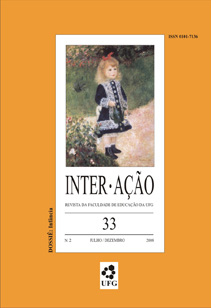The affective dimension in the development of the child. Contributions from the theory of Henri Wallon
DOI:
https://doi.org/10.5216/ia.v33i2.5271Abstract
This paper uses a theoretical approach to study the concept of affectivity as proposed by Henri Wallon. The analysis begins with the concept of affectivity in a psychogenetic and differentiated perspective of the manifestations of emotion, feeling and passion. The Wallonian theory of affectivity is systematized, emphasizing its contributions to the study of human development as well as the limits that indicate the need for new studies. Finally, the results allow us to consider the importance of the study of affectivity for the formation of teachers. The lack of a professional training that considers affectivity and its implications for intellectual activity is damaging to education. The consequences of this omission are reflected in the classroom and in interactions where pedagogical practice is established.Downloads
Downloads
Published
How to Cite
Issue
Section
License
Inter-Ação uses the Creative Commons Attribution 4.0 License for Open Access Journals (Open Archives Initiative - OAI) as the basis for the transfer of rights. Open access means making documents available on the Internet free of charge, so that users can read, download, copy, distribute, print, search, or link to the full text of documents, process them for indexing, use them as input data for software programs, or use them for any other lawful purpose, without financial, legal, or technical barriers.
Authors publishing in this journal agree to the following conditions:
1) Authors retain copyright and grant the journal the right of first publication, with the work simultaneously licensed under the Creative Commons Attribution License, which permits redistribution of the work with attribution and first publication in this journal.
2) Authors are permitted to enter into additional, separate agreements for non-exclusive distribution of the version of the work published in this journal (e.g., for publication in an institutional repository or as a book chapter), with attribution and first publication in this journal.
3) Authors are permitted and encouraged to publish and distribute their work online (e.g. in institutional repositories or on their home page) at any time before or during the editorial process, as this may generate productive changes as well as increase the impact and citation of the published work.
















